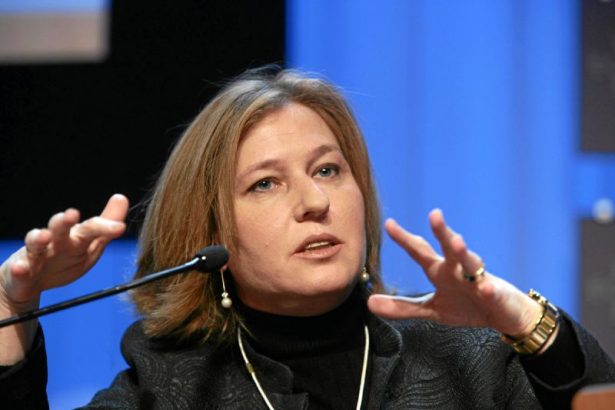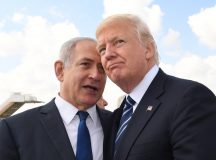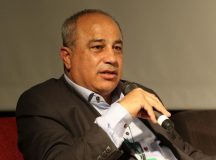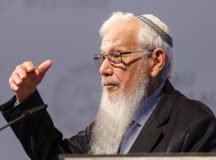Tzipi Livni, Israel’s former Foreign Minister and a leading peace negotiator, argues that Israel faces a hard choice: whether to focus on the vision of the State of Israel as a Jewish and democratic state, the nation-state of the Jewish people with equal rights to all its citizens; or the vision of Greater Israel, whose meaning is having two kinds of citizenship or a binational state.
Tzipi Livni: Israel is really a miracle. Seventy years ago, we were a small community that absorbed and subsequently integrated millions of Jews who came from all over the world; we are the strongest army in the region, a diverse society that lives together, and the Start-Up Nation. And that’s before we discovered the natural gas reserves.
The day that Israel was established was the same day that my parents got married – the first couple who were married in the independent State of Israel. They came from the underground, as freedom fighters in the Irgun. They believed in the Greater Land of Israel – the symbol of the Irgun was a map of the area on both sides of the River Jordan, across which was a gun and ‘this is the only way’. And although I am in a different place politically from them, the dreams they had for their children are the same ones I have for mine.
When the State of Israel was established, the Jewish leadership accepted the UN Partition Plan not only supporting the establishment of a Jewish state but also supporting the division of the Land of Israel. The Arabs fought against this idea, and literally fought against the new State. In 1967, people danced in the streets of Tel Aviv when Jerusalem was liberated and I remember the first time my father took me to the Western Wall, and the Cave of the Patriarchs in Hebron. We really felt this it was historic.
Yet nobody made the decision what to do with this newly-acquired ancient land.
We have reached the point when we need to choose. After 70 years, the hard choice for us is whether to focus on the vision of the State of Israel as a Jewish and democratic state, the nation-state of the Jewish people with equal rights to all its citizens; or the vision of Greater Israel, whose meaning is having two kinds of citizenships or a binational state.
This is basically the choice.
The other major challenge relates to Israeli society. There are huge gaps between different parts of Israeli society and within Israel politics and everyone is representing their own sectoral-based interests. We need to understand that each of the groups understands Zionism in a different way but are Zionists nonetheless, and this can lead to a better dialogue between Israeli Jews.
We also need to open a new dialogue between Israel and the world’s Jews. The traditional paradigm was that ‘Israel is a safe haven for you in case of antisemitism and therefore you should donate money and use your influence when needed’. But that is no longer correct. Now we should say: ‘Israel is your home too; when we make decisions here, as Israeli leaders, we are not only thinking about Israeli citizens, but also about you.’ Being the nation-state of the Jewish people is also a matter of values. It’s not solely the mere existence of the state as a safe haven. We should respect the various ways that different streams in Judaism are expressing their faith. But unfortunately, that is not happening. At the same time, equality is a Jewish and democratic value and being a Jewish state with equal rights to all the citizens means that the Israeli Arabs have equal rights as citizens, although their national aspirations will not be fulfilled in Israel.
RP: You spoke about your upbringing in the Jabotinsky worldview. In some ways you are now synonymous with the peace camp and the two-state solution. Was there a moment that marked that transition for you?
TL: It was long before I joined politics. I decided to get into politics because my voice was not being heard. I am a lawyer by profession and didn’t particularly want to get involved in politics. My father was in politics, and he didn’t particularly like it either. Maybe he was too decent for politics; he couldn’t even ask people to vote for him! But in 1995, after the Oslo agreement, I watched Israeli society divide into two camps. One was the camp of peace, talking about this vision of the ‘new Middle East’. On the other side was the camp of ‘Greater Israel,’ which focused on our rights and how we shouldn’t give any inch of the land to the enemies. This was a few weeks before Prime Minister Yitzhak Rabin was murdered.
I felt I was in-between. I had the same sentiments towards the Land of Israel as the political Right did. But it was clear to me we couldn’t keep it all. As a lawyer I thought the Oslo agreements were full of holes – it was more a memorandum of understanding – that was vague and postponed all the core issues until the end. I felt my voice was not being heard in these debates, so I decided to enter politics.
Israel needed to keep the Oslo agreement but also to negotiate in a manner that would maintain our interests. Ultimately it’s not about whose narrative is more just, ours or the Palestinians’. It’s about whether we want to live together, or to separate into different states.
My father was no longer alive, but one day my mother called me and said: ‘Tzipi, I heard what you said and it hurts me, but I see all the young people leaving for America and we didn’t fight for a state just for the older generation, so it’s your decision.’
RP: From your time leading the negotiations and spending many hours with the Palestinians, where is your sense of their willingness to make peace?
TL: I have criticisms of the Palestinians, but I think we need to focus on what we want. This is what the Jewish leadership did in 1948. People celebrated after the UN Partition Plan, even though it recommended dividing the land because it was about establishing a state. The leadership chose a compromise. If they had insisted instead on pushing claims for the entire Land of Israel then maybe the state would not have come about at all.
What we need is to put our destination into our national GPS. And when putting in the coordinates, we should be guided by the same principles that guided the 1948 leadership, namely; that we are the ones who should decide what our vision is, independent of what the Palestinians may want; and second, that the idea of living in our sovereign Jewish and democratic state is more important than controlling that of the entirety of the Greater Land of Israel.
My vision and my destination is a Jewish and democratic state in a part of the ancient Land of Israel. And for this I need to separate from the Palestinians, otherwise I will face an Arab majority, or 50-50, and I don’t want to choose between a Jewish or a democratic state. Others have a different destination in their GPS – the Greater Israel. But first we need to decide. And then we can concentrate on the other side – to what extent we can reach an agreement with them and on what terms. Currently, Israeli society is divided over what destination to put into our national GPS.
RP: As well as convincing the international community, how do you convince the Israeli public to take that path?
TL: The most important thing for most Israelis is security, and on that I share the same understanding as many on the Right. I was a member of the Israeli cabinet and I supported every military operation against Hamas and Hezbollah. But we need to combine military action with political action. They go together. I would never preach peace without maintaining Israeli security. I hope Israelis will understand this.
RP: As we approach Israel’s 70th birthday one of the other unresolved issues is Israel’s role in the region. Proponents argue that Israel should build up relations with the pragmatic Sunni Arab states in the area. How do you see Israel’s regional relations evolving in the future?
TZ: The bridge is there. But there are troubled waters below the bridge: I mean the Israeli-Palestinian conflict. If we can calm those waters then we will be able to cross the bridge. I have had meetings with Arab leaders who understand that Iran is their main threat and Israel is not their enemy. But they have their own public opinion to deal with. Even if the Palestinians are not their first priority, they cannot have peace with Israel without solving the issue. Were Israel to make peace, it wouldn’t just be one plus one, but rather, according to the Arab Peace Initiative, one (the Palestinians) plus the entire Arab and Muslim world. Reaching an agreement with the Palestinians would change Israel’s strategic place in the region. And the Arab Peace Initiative is negotiable, it’s not a ‘take-it-or-leave-it’. But it’s difficult to convince Israelis because it doesn’t seem tangible.
I need to convince Israelis that the Biblical phrase am levadad yishkon ‘a people that dwells alone’ is not a blessing and it can be changed. I think that after 70 years a vast majority of Israeli believe that this is part of who we are: defending ourselves, being a small state. But this isn’t our DNA. The DNA of the Jewish people was more about contributing to the world in different ways – in culture, values etc. – rather than being proud only because we are small and need to defend ourselves. There are so many things for us to be proud of. This doesn’t need to be the only one.





































Comments are closed.